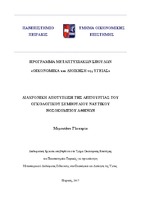Διαχρονική αποτύπωση της λειτουργίας του Ογκολογικού Συμβουλίου Ναυτικού Νοσοκομείου Αθηνών
Outline of the cancer MDT setting in Athens Naval Hospital over time

View/
Keywords
Ογκολογικό συμβούλιο ; Διεπιστημονική ομάδα ; Καρκίνος ; Ναυτικό Νοσοκομείο Αθηνών ; Cancer Multidisciplinary Teams (MDTs) ; Tumor board ; CancerAbstract
Cancer multidisciplinary teams (MDTs) are well established in many countries worldwide and recently, in 2012, they were also implemented in Greece. Multidisciplinary teams, through the collaboration of professionals with different medical specialties, aim at the delivery of the best possible treatment for cancer patients. There are no published studies on MDTs operating in Greek hospitals. The present retrospective research study, of the operation of the Athens Naval Hospital's cancer MDT was carried out, in order to fill this bibliographic gap. Archive material was used for the period 2014 to 31 July 2017 and 132 meetings were examined in which 623 medical cases were referred to. Topics related to the operation of the cancer MDT, the characteristics of the patients referred to, as well as the effectiveness and efficiency of the MDTs were analyzed. Specifically, frequency of the meetings, participation and composition, educational role, time requirements and cost. Gender and age of the patients at the time of diagnosis, type and stage of the disease, and the approaches selected by the MDT. Finally, patients' waiting times were measured from diagnosis to referral to MDT and to the onset of treatment. The results of the research showed that while the total number of cases remained unchanged over the years, there was an increase in the frequency of meetings and at the same time a decrease in the number of participants. The majority of the participants were specialist doctors and the absence of specialized doctors is evident. 67% of patients were referred to the tumor board by doctors in the surgical field and 8-9% of the reported cases were not directly discussed due to non-attending physicians. Cancer MDTs suggested a therapeutic approach to 81% of the patients. The findings of this research coincide with WHO's data on gender and age and differentiate in the frequency of diagnosis, especially of colon and breast cancer. It was estimated that 19% of patients referred to the MDT were patients re-evaluated by the team and 26% of patients had already metastatic disease at the time of diagnosis. Finally, it was found that the care provided to patients declined as their waiting times, regarding referral to the team and onset of treatment, increased. In 2014, 92% of patients started treatment within 62 days of diagnosis and in 2017 only 68% of patients. It is therefore necessary to implement measures to reduce the waiting times of cancer patients.


